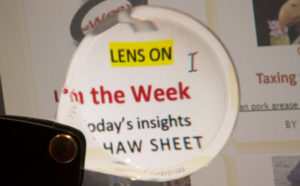18 January 2018
Lens on the Week

UK
STAR PERFORMER: Shadow foreign secretary Emily Thornberry refers to Trump as an “asteroid of awfulness”. Kim Jung-un refers to him as a mentally deranged dotard. Sometimes it is difficult to remember who is allied with who. Let’s hope that the American’s don’t forget, as paying for our own defence could be expensive.
ARMY: The Army used to use the advertising slogan “Be The Best”, but market research seemed to show that the slogan was out of date and elitist. The Army was prepared to drop it but was overruled by The Defence Secretary. However, the words are not used in the latest advertising campaign, run by the management consultants/computer specialists Capita.
Recruitment is important because successive governments have cut the number of soldiers as part of the austerity drive, and now the Army is seeking new personnel, presumably to fill the gaps left by those made redundant. In an attempt to be more accessible to all, the Army is using social media to tell young people who may be thinking of applying, that they will not be criticised for praying, bursting into tears or having feelings.
So the loud mouth aggressive drill sergeant major is out (as portrayed in films such as Full Metal Jacket). It will now be acceptable for a squaddie to wish fervently that Arsenal does well, to pray for the team’s success and cry his eyes out when they lose. No doubt counselling will be offered.
UKIP: The leader of UKIP, Henry Bolton, has parted from his partner Jo Marney, after she was accused of making insensitive, racist remarks about Prince Harry’s fiancée, Meghan Markle. A statement issued on her behalf made two points. The first was that the words had been taken out of context, and the second was that she apologised unreservedly for any offence which might have been caused.
If the words used had been taken out of context, then the obvious course of action would be to publish all the material so that the context is made clear. If the words had been taken out of context, meaning that she is innocent, then why apologise?
People in the public eye, whether politicians, sportsmen and women or show business personalities, when caught out, issue similar statements. As commentators have pointed out, a conditional apology (“I am sorry if I have caused offence”) is worthless. Either the person concerned apologises or does not. Is there a hint or flavour that the people who complain are over-sensitive and should not be offended at all and that, in fact, it is somehow their fault?
International
REACTION: In Iran, Ayatollah Ali Khamenei announced that security forces have put an end to the recent widespread protests. The police claim that 1000 people have been arrested, though an Iranian MP has said that 3700 have been arrested. At least one person has died in prison; Amnesty International says that five people have died following arrest.
In Venezuela, the Interior Ministry announced that Oscar Perez has been arrested in the El Junquito neighbourhood of Caracas. Oscar Perez is the colourful and controversial ex-police officer who apparently tried to trigger an armed rebellion against President Maduro’s regime during last year’s anti-government protests, by stealing a military helicopter which he then flew over Caracas to drop grenades on the supreme court. Six months later he allegedly launched an attack on an army barracks and tried to trigger a mutiny. This week he was captured (and some reports suggest he was killed) during a military operation against his hide-out; police and troops engaged Perez and his men in a shoot-out which lasted several hours and left at least five people dead and five seriously injured. Some conspiracy theorists have claimed that Oscar Perez’s activities are orchestrated by the government to suggest that its enemies are violent and dangerous mercenaries and adventurers.
In Tunisia, widespread demonstrations (coinciding with the anniversary of the Arab Spring) against rising prices and new taxes have resulted in over 800 arrests, five injuries and one death (apparently caused by tear gas) among the protesters. At least fifty policemen have been injured. The UN and rights groups are reportedly concerned by the high number of arrests.
FATAL ACCIDENTS: January, not April, appears to be the cruellest month. No happy new year for many in the USA, Colombia, Indonesia or at sea:
At least 17 people were killed in Santa Barbara, south California, when torrential rain sent mudslides pouring down mountainsides. The area, home to wealthy celebrities, was devastated by record wild-fires only last month.
The oil tanker Sanchi sank with the loss of its crew of 32 off the coast of eastern China. It had been on fire for a week after a collision with another ship.
At least 10 construction workers were killed when an almost-completed motorway bridge collapsed in Colombia. The Chirajara bridge would have been 446m long and one of the highest in the world. The death toll would have been much higher had hundreds of other workers not been off-site at the time; they were attending a safety briefing nearby.
A mezzanine floor at the Jakarta stock exchange collapsed, leaving at least 75 people injured. Most of them were visiting students. Fortunately, no deaths have been reported.
Financial
FINAL BELL AT CARILLION: The collapse of Carillion may have come as a surprise to the politicians, but not so much to Shaw Sheet readers, or to the City, where the building contractor to services group’s problems have been well ventilated over the last year or so. The business issued a series of profit warnings over the summer of 2017, and changed both its chief executive and finance director, often a sign of trouble. Carillion is a very complex company because it has specialised in PFI – building and operating buildings for the government, such as schools and hospitals, where it provides a complete turnkey service – staffing hospitals and schools on long term contracts to detailed contractual targets (financial and qualitative), meaning it has a large number of employees. It also has conventional building contracts for commercial buildings, is a nominated contractor for HS2, and for the rebuilding of the A14 trunk road, and had a large business in the Middle East, in the process of being wound down. The cause of the failure is that classic one of building contractors – over expansion on narrow margins, financed by too much debt, exacerbated by big losses in the Middle Eastern business and disputed payments which have had to be written off. Due to the complexity of the business it is not clear how much debt there will actually turn out to be, but estimates are between £1bn and £2bn – the variation being largely due to the contingent liabilities and cross guarantees, some of which may crystallise and others not. The PFI service business should be relatively easy to get picked up by other providers, but finishing some of those major building contracts could be very tricky – and will almost certainly lead to further delays to the HS2 project.
INFORMATION IS POWER: Shareholders in Informa and in UBM will be hoping information is also money; the two companies, listed in the FTSE100 and FTSE250 indices respectively, are contemplating a merger. Informa is the bigger of the two, with a market value of around £6bn, from a business which publishes many specialist trade magazines – most famously Lloyds List, the journal of the shipping market, but many others, including a batch of specialist academic journals. Onto that it has bolted in recent years a business running conventions and specialist trade conventions – a continuing growth sector in spite (or maybe because) of electronic direct communication. UBM, a £3bn business, is in the latter sector also, but the two operations are a good fit – there is a little competition between them at the trading level and UBM is especially strong in the Far Eastern market, partly through its acquisition in 2016 of Allworld, a smaller rival. Informa would like to grow much faster in that part of the world and this deal, if it is consummated will achieve that aim at one step. Business growth in the Far East and the growing power and strength of universities in China and other Pacific Rim countries means that publishing and business conventions are rapid growth sectors, though they continue to be especially strong in the USA. Informa does 60% of its business stateside, and would like to reduce its dependence on that profitable but immensely competitive market. UBM was founded in its present form by former prime minister David Lloyd George as a newspaper publisher, to safeguard newspapers during the 1930’s depression, and remained in newspapers until the millennium, selling that business to concentrate on its current activities. The deal is been structured as a takeover of UBM by Informa whose shares initially fell by 8% – they will be hoping that when the shareholders are better informed the price will recover.


